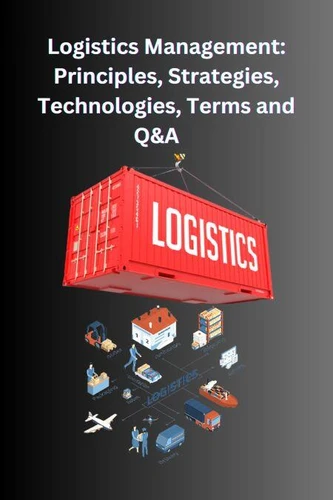Logistics Management: Principles, Strategies, Technologies, Terms, and Q&A
Par :Formats :
Disponible dans votre compte client Decitre ou Furet du Nord dès validation de votre commande. Le format ePub protégé est :
- Compatible avec une lecture sur My Vivlio (smartphone, tablette, ordinateur)
- Compatible avec une lecture sur liseuses Vivlio
- Pour les liseuses autres que Vivlio, vous devez utiliser le logiciel Adobe Digital Edition. Non compatible avec la lecture sur les liseuses Kindle, Remarkable et Sony
- Non compatible avec un achat hors France métropolitaine
 , qui est-ce ?
, qui est-ce ?Notre partenaire de plateforme de lecture numérique où vous retrouverez l'ensemble de vos ebooks gratuitement
Pour en savoir plus sur nos ebooks, consultez notre aide en ligne ici
- FormatePub
- ISBN8223390671
- EAN9798223390671
- Date de parution18/04/2023
- Protection num.Adobe DRM
- Infos supplémentairesepub
- ÉditeurDraft2Digital
Résumé
Logistics is a critical aspect of modern business, and its effective management is essential for companies to remain competitive in today's global marketplace. Logistics Management: Principles, Strategies, Technologies, Terms, and Q&A is a logistics guidebook that explores the various functions of logistics management, including transportation, distribution, inventory management, warehousing, supply chain management, logistics questions, answers, terms, and performance measurement. This logistics management books provides readers with a detailed understanding of the key principles and strategies of logistics management, and how they can be applied to enhance the operational efficiency of their organizations.
It covers the latest trends and technologies in logistics, including the use of automation, artificial intelligence, and blockchain, and explains how these innovations can be leveraged to improve logistics performance and sustainability. The logistics books also provide insights into the various types of logistics outsourcing and the factors that organizations should consider when outsourcing their logistics operations.
It also explores the importance of logistics sustainability and provides strategies for improving the environmental and social impacts of logistics. With case studies and examples from real-world logistics operations, terms, and interview Q&A this logistics management book provides readers with practical insights and recommendations for enhancing their logistics operations. It is a valuable resource for students, academics, and professionals in logistics management, as well as for anyone interested in understanding the key principles and strategies of logistics management.
It covers the latest trends and technologies in logistics, including the use of automation, artificial intelligence, and blockchain, and explains how these innovations can be leveraged to improve logistics performance and sustainability. The logistics books also provide insights into the various types of logistics outsourcing and the factors that organizations should consider when outsourcing their logistics operations.
It also explores the importance of logistics sustainability and provides strategies for improving the environmental and social impacts of logistics. With case studies and examples from real-world logistics operations, terms, and interview Q&A this logistics management book provides readers with practical insights and recommendations for enhancing their logistics operations. It is a valuable resource for students, academics, and professionals in logistics management, as well as for anyone interested in understanding the key principles and strategies of logistics management.
Logistics is a critical aspect of modern business, and its effective management is essential for companies to remain competitive in today's global marketplace. Logistics Management: Principles, Strategies, Technologies, Terms, and Q&A is a logistics guidebook that explores the various functions of logistics management, including transportation, distribution, inventory management, warehousing, supply chain management, logistics questions, answers, terms, and performance measurement. This logistics management books provides readers with a detailed understanding of the key principles and strategies of logistics management, and how they can be applied to enhance the operational efficiency of their organizations.
It covers the latest trends and technologies in logistics, including the use of automation, artificial intelligence, and blockchain, and explains how these innovations can be leveraged to improve logistics performance and sustainability. The logistics books also provide insights into the various types of logistics outsourcing and the factors that organizations should consider when outsourcing their logistics operations.
It also explores the importance of logistics sustainability and provides strategies for improving the environmental and social impacts of logistics. With case studies and examples from real-world logistics operations, terms, and interview Q&A this logistics management book provides readers with practical insights and recommendations for enhancing their logistics operations. It is a valuable resource for students, academics, and professionals in logistics management, as well as for anyone interested in understanding the key principles and strategies of logistics management.
It covers the latest trends and technologies in logistics, including the use of automation, artificial intelligence, and blockchain, and explains how these innovations can be leveraged to improve logistics performance and sustainability. The logistics books also provide insights into the various types of logistics outsourcing and the factors that organizations should consider when outsourcing their logistics operations.
It also explores the importance of logistics sustainability and provides strategies for improving the environmental and social impacts of logistics. With case studies and examples from real-world logistics operations, terms, and interview Q&A this logistics management book provides readers with practical insights and recommendations for enhancing their logistics operations. It is a valuable resource for students, academics, and professionals in logistics management, as well as for anyone interested in understanding the key principles and strategies of logistics management.























